
Quincy, Illinois-based custom manure applicator, Precision Pumping Inc.
is using new technology and a high level of customer service to
reassure its customers that they are getting exactly what they are
paying for when it comes to manure application.
Quincy, Illinois-based custom manure applicator, Precision Pumping Inc. is using new technology and a high level of customer service to reassure its customers that they are getting exactly what they are paying for when it comes to manure application.
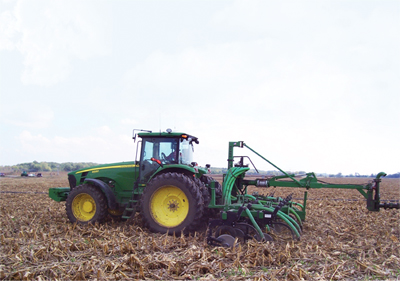 |
|
It starts with the use of a drag hose system that will typically deliver manure from hog or dairy lagoons or pits up to three miles for application on farmland. They use auto-track John Deere tractors so that the tractor pulling the hose is propelled at a constant speed in a straight line, with liquid manure flow from the toolbar monitored from the cab, ensuring they never miss spots on the field. They also use a GPS in each tractor. The GPS card is removed from the tractor after each application, a map is generated and it is included with the invoice sent to customers. The detailed map shows exactly where the manure was applied, as well as setbacks in relation to sensitive areas such as bodies of water, roads, and houses. Customers have the ability to take the data from the GPS and apply it to their commercial fertilizer spreader to automatically change fertilizer application rates where manure was applied.
Managers at Precision Pumping Inc. also do considerable leg work in the off-season to meet with customers, select fields for application, and determine the application rate per acre based on the analysis of manure pit or lagoon nutrients.
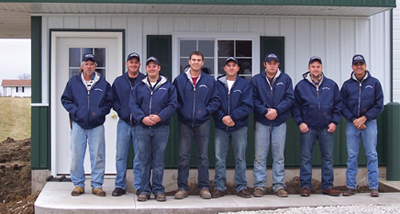 |
|
| Some of the key employees at Precision Pumping are (from left to right): Ed Obert, Robbie Wellman, Daniel Mowen (crew manager), Jered Peter (owner/business manager), Derek Peter (owner/crew manager), Cutter Duncan, Andy Skirvin and Randy Peter (owner/business manager). Advertisement
|
“We try and make everything as accurate as possible and do as good a job as we can for our customers,” says Precision Pumping co-owner, Jered Peter. “Manure is worth a lot of money now and it needs to be treated like fertilizer and not manure. We are learning new things every year to try to make things better and do things differently.”
Jered, 24, owns the business with his parents, Randy and Debbie Peter, and brother, Derek, who is 27. They started out by operating a drag hose system to manage manure generated on Randy’s hog farm, applying the manure where they also grow about 800 acres of corn.
In 2005, they expanded the business from one crew to two so that Derek and Jered could each have their own operation. In 2008, the company applied 104 million gallons of manure with two crews. In early 2009, the company expanded to three crews, with Daniel Mowen, crew manager, in charge of that operation. Precision Pumping expects to achieve 50 million gallons per crew per year in the future. It has a total of 10 employees, including the owners, who are actively involved in day-to-day business operations.
With its location in west central Illinois, Precision Pumping is able to service customers in western Illinois, northeast Missouri, and southeast Iowa. Among its biggest customers are farmers raising hogs for large commercial hog producers. Because of bio-security requirements for managing these operations, Precision Pumping takes extreme precautions to minimize the potential of transferring pathogens from one farm to another. The company has just constructed a new wash facility and shop on the family farm, making it even easier to wash and disinfect equipment between jobs and monitor the quality of the work. If they are working several hours from home, each mobile crew has pressure washing and disinfecting capabilities included on their pump trailers.
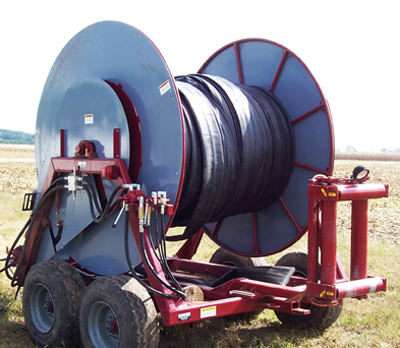 |
|
| Precision Pumping has enough hose to apply manure on farmland seven miles away from the lagoon or manure pit.
|
Drag hose manure application system manufacturer Hydro Engineering is a major equipment supplier to Precision Pumping. They assisted with the design and equipping of the company’s four pump trailers that house low emission and fuel efficient John Deere engines as the primary power source to pump the manure from the storage facility. The pump trailer is equipped with a hydraulic boom, which reaches out 42 feet and places a hydraulically driven pump into the 8- to 12-foot deep pit or lagoon. The pump force-feeds the main pump, keeping the flow constant to the field. This is one of the many things that keeps this business efficient. Because of the lagoon pumping method employed by Precision Pumping, Peter says they can get by with two engines at the lagoon site, one pumping and one agitating.
The manure flows through a 17-inch Pioneer pump, which is powered by the John Deere engine mounted on the trailer. It flows through the connected sections of the 6-inch main line hose until it reaches the field, and then through a drag hose, which is connected to the applicator. An equalizer has cutting edges that chop anything that would block the manure getting through the shanks. The shank delivers the manure about 4 or 5 inches under the soil so that it is completely covered, which reduces odor and the volatilization of the valuable nutrients.
Peter says agitation is another important part of doing a good job. A lagoon agitator or pit agitator is powered from a tractor PTO; it moves to various locations along the lagoon or pit to agitate the manure to keep the solids in suspension and to keep the manure more consistent in the field. The company has three Houle pit agitators and two lagoon agitators in its fleet. The lagoon agitators are 42 feet long and are able to reach out to the centre of the lagoon.
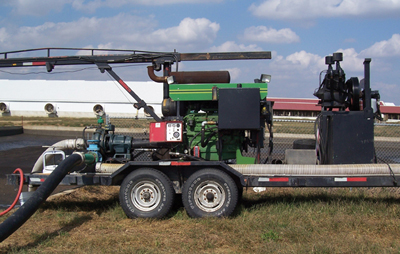 |
|
| The backbone of Precision Pumping’s custom manure application service is three custom designed mobile trailers with all the equipment a crew needs to get the job done on site.
|
To manage the hose required to transport the manure from the pit to application sites, Precision Pumping owns seven Hydro Engineering hose carts, equipped with hydraulic drives and guides on the back of each cart.
Peter says the company opted for a drag hose system versus hauling manure for field application primarily because they believe it is a more efficient, faster system that results in less soil compaction. He says when pumping to locations close to the pit, they are able to achieve flow of 1600 gallons per minute, and with assistance from booster pumps, can maintain 1300 gallons per minute out as far as five or six miles, although applying the manure over such a long distance is rarely, if ever, done due to the expense. He adds that farm customers appreciate how much less compaction this system creates.
“Our shanks are actually heaving the ground and reducing compaction, whereas with a tank, you have so much weight creating compaction,” Peter says. Because they never run empty, there is no driving back and forth on the field or guesswork as to where they may have left off, as is sometimes the case with tankers.
A downside of a drag hose system is the obvious limitation of distance, which is why a tanker or purpose-built mobile manure application system may be the only option for some manure generators. Another disadvantage for some farmers or custom manure applicators may be the cost of a well-equipped drag hose system.
“It costs over $650,000 for a crew and a lot of farms just can’t afford that,” says Peter, “but in a custom operation, where we are doing 115 to 120 different farms, we can justify it.”
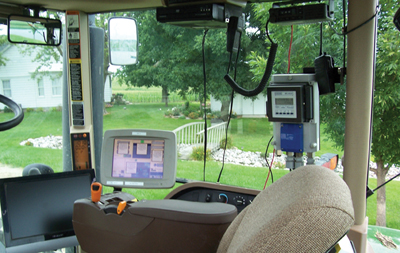 |
|
| Monitors inside the tractor cab provide the operator with immediate information about his/her position on the field and the manure flow rate during application.
|
Precision Pumping has three applicators that they use on their tractors. Two are 26 feet wide and one is 22 feet wide. The applicators are Hydro Engineering toolbars with Dietrich 60 series slurry direct injectors equipped with eight-inch-wide sweeps and designed for minimum tillage.
“We actually have customers with highly erodable ground where we will go there in the fall, apply manure on 350 acres, and in the spring they come in with no tilling right behind where we put in the manure,” says Peter. “You can hardly tell we were out there come spring time. We can apply a full year’s worth of fertilizer without anyone knowing we were in the field.”
For dragging the hose across the field and applying the manure, Precision Pumping uses identical 230-horsepower, 8330 John Deere tractors, with front wheel assist and auto track and GPS mapping capability. Manure flow is controlled with Krone flow meter systems. It has a display in the cab so that the operator is aware of how many gallons per minute are being applied at all times. The application rate per acre is determined by the speed of the tractor, which is held constant and controlled by an Infinite Variable Transmission (IVT).
For safety, each tractor is also equipped with radio shutdown systems that allow the operator to slow down the pump engine, speed it up, or shut it down completely from the seat of the tractor.
Precision Pumping tries to have at least three crew members per trailer unit, and each trailer is equipped with a Kawasaki four-wheeler so that employees can monitor the hoses and application in the field.
Precision Pumping’s busiest times of year are spring and fall, after the crops are removed, with about 75 percent of its customers growing corn exclusively. In those instances, the application rate is about 4000 to 5500 gallons per acre from finishing barns, except if the manure source is from lagoons or pitted sow manure. In that case, the application rate is 10,000 to 14,000 gallons per acre.
Some manure is applied on pasture and wheat crops in summer, and this is one area of the business Precision Pumping is hoping to greatly expand in future. To assist with building that part of the business, the company has constructed a 24-foot pasture applicator called a Gen-til manure applicator that broadcasts manure and aerates the ground at the same time. Peter says customers are extremely happy with the way this toolbar has improved their pastures and hay crop.
Precision Pumping is always looking for ways to satisfy their customers’ demands and the proof is in the amount of repeat business and growth that is occurring within the company from one year to the next.